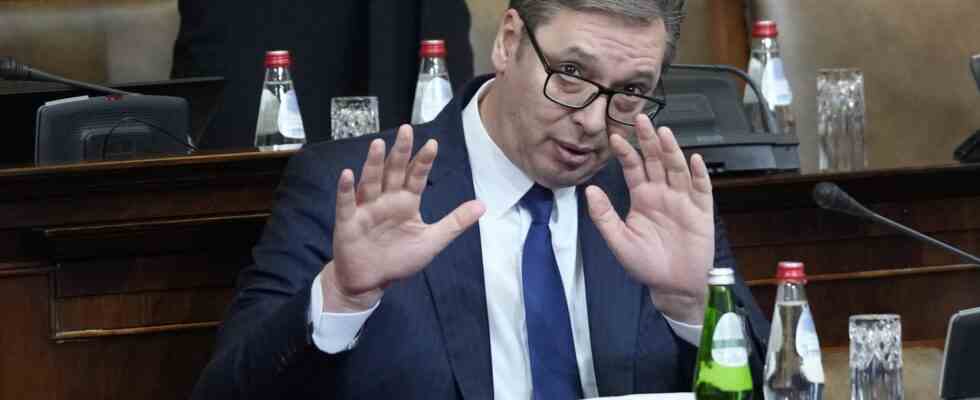Status: 02/02/2023 6:55 p.m
Since the end of the recent confrontation between Serbia and Kosovo, Serbian President Vucic has come under criticism. The nationalists, who previously saw him as an ally, accuse him of treason. How does Vucic react to this?
It’s not often that Serbia’s president is loudly criticized. Alexander Vucic, whose style of government bears autocratic traits, is too firmly in the saddle. After his surprising change of course on the Kosovo question, however, he was insulted as a traitor in the National Assembly this Thursday.
When the head of state defended his change of course in parliament, nationalist opposition politicians held up banners and signs. Their demand: “No surrender”. They want a clear rejection of the plan that Germany and France had developed to end the ongoing tensions between Serbia and Kosovo. Among other things, this provides that the two neighboring countries do not formally recognize each other, but accept each other’s state existence.
A member of parliament from the clerical-nationalist party called Vucic’s course “outrageous” and told the president that he had “no constitutional powers whatsoever”. Applause for the President breaks out again and again from the ranks of the governing faction, but that does not hide the fact that Vucic is under great pressure.
It also comes from outside. The day before the President explains his policy, he gets a call from US Secretary of State Anthony Blinken. The USA finally wants relaxation in the Balkans.
Vucic’s critics in the Serbian parliament accuse him of “treason” and protest against an alleged ultimatum to Serbia.
Image: AP
Skeptical and state-supporting at the same time
During the parliamentary session, Vucic defended his new line for an hour and a half. He is relying on rapprochement instead of military threats, as was the case a few weeks ago. Vucic reassured: Nothing has been signed yet. Further talks will be held.
Vucic is skeptical: numerous points listed in the Franco-German plan to bring peace to the region are difficult or unacceptable. But Vucic then appears supportive of the state: the step towards relaxation is in Serbia’s vital interest. He means the orientation towards the European Union.
That is his declared goal, as Vucic assured in a newspaper interview just a few weeks ago. Serbia’s strong man doesn’t want to jeopardize the aspired EU membership, and so he says today: Serbia must stay on the “European path” because “many things” depend on it, such as “investments, the standard of living, pensions and salaries.”
Where Vucic is from
The fact that numerous nationalists are now calling for treason has to do with Serbia’s history, but also with Vucic himself. He comes from the nationalist movement and tolerates demonstrations in support of Putin’s war against Ukraine. His new secret service chief is a declared friend of Russia. In addition, Vucic does not support the sanctions against Russia. That doesn’t go well with rapprochement with the EU.
Kosovo, which is at issue in Parliament today, is considered a breakaway province in Serbia. The slogan “Kosovo = Serbia” is written on several motorway bridges around Belgrade.
For the nationalistically thinking Serbia, the recognition of Kosovo’s independence is therefore unthinkable. While the President is speaking in Parliament, an elderly gentleman outside on the street says that without Kosovo, Serbia would lose its identity.
One woman even calls Kosovo the “Serbian Jerusalem” and warns against seeing the issue only politically. For them it is about the Serbian soul. Ordinary citizens now have to fight for what they consider righteous before God: “We must not allow our Serbian country (Kosovo) to be given away. But don’t worry, it will remain Serbian forever, for sure,” she says .
The right time to change course
Loud as the criticism may be, now may be the right time for Vucic to change course. The Serbian President need not fear a fall. Only last year were he and his party clearly confirmed. The next regular elections are three years from now.
Vucic could also sell it as a success that the Kosovan government no longer wants to see the establishment of an association of Serbian communities in the way. A step that was only achieved through massive pressure from the USA and the EU on Kosovo’s Prime Minister Kurti.
In any case, the Serbs living in Kosovo, whose centers are mainly in the north and south of the country, should be given far-reaching autonomy rights with a community association.
A majority wants to join the EU
Normal relations between Serbia and Kosovo should be welcomed above all by Serbia’s young population, which thinks clearly pro-European. The majority of Serbian society also wants to see their country in the European Union, although support for the EU has recently fallen somewhat.
The President knows that too. In an interview with the ARD Vucic recently said:
If you ask people where they want to live, they always get the same answer: in the European Union. So we have to solve this mess in the region, create peace and security – and then you can tell people we have to focus on the future and I have no doubt that our future belongs to Europe and the EU and we are part of are Europe.”
After that, Vucic now seems to be very specific about his policy. Even if everyone involved is aware that it will still be a long time before there is real detente between Kosovo and Serbia.

